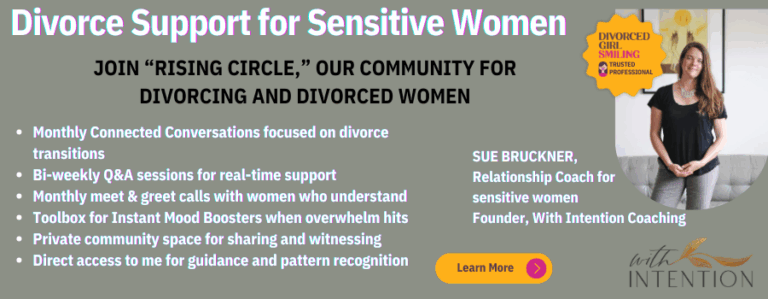If you’re a sensitive woman who feels trapped in endless cycles of overthinking, you’re not alone. Research shows that 73% of adults aged 25-35 and 52% of those aged 45-55 experience overthinking in their daily lives. For highly sensitive people, this mental overwhelm can feel even more intense and exhausting. Wondering how to stop negative overthinking and quiet your mind?
The Hidden Cost of Overthinking for Sensitive Women
Overthinking, also called rumination, isn’t just “thinking too much.” It’s a process of repetitive negative thinking that significantly increases your chances of developing depression and anxiety.
The statistics paint a sobering picture of our collective mental state:
- 43% of adults feel more anxious than they did the previous year, up from 37% in 2023
- 53% of adults say stress has the biggest impact on their mental health
- Nearly one-half of those diagnosed with depression are also diagnosed with an anxiety disorder
For sensitive women, these numbers hit even harder. Your natural depth of processing—your gift for feeling deeply and noticing subtleties—can become a liability when it turns into rumination.
Overthinking doesn’t just exhaust your mind; it taxes your entire nervous system. And when you’re already highly sensitive, that mental noise can become overwhelming.
What Really Happens When You Can’t Stop Overthinking
Here’s what research tells us about the overthinking brain:
Studies show that rumination leads to negative thinking, poor problem-solving, inhibited behavior, biased information processing, and impaired relationships. It’s not just annoying—it’s actively undermining your ability to function and connect.
Even more concerning: rumination predicts the onset of new depression episodes, maintains existing depressive symptoms, and reduces response to treatment.
But here’s what the statistics don’t capture: the exhaustion. The way overthinking steals your energy, your presence, your ability to enjoy simple moments. The way it creates what I call a “toxic inner world” that matches whatever chaos is happening around you.
I know this intimately because I lived it.
My Breakthrough Moment: The Day I Got Sick of Myself
When I was still in my deeply unhappy marriage, I had a breakthrough that changed everything. And ironically, this moment came at the expense of me ruminating, ruminating, and ruminating.
I was at the park doing my daily walk, completely lost in my head. I was thinking of all the things going wrong in my marriage, validating why I was upset, replaying the same scenarios I had rehearsed the day before, and the day before, and the day before.
But I was unaware of how much I had been creating a toxic inner world that matched my toxic outer world.
Until this moment when I rounded the corner and my whole being rebelled.
I stopped.
Out loud, I said: “I’m so fucking sick of myself.”
Because I had gotten myself so exhausted by staying in my head, and I just couldn’t do it anymore.
The Universe’s Wake-Up Call
What happened next felt like the universe offering me exactly what I needed to hear.
I was listening to an audiobook when I heard something that stopped me in my tracks: that most of what we think today, we’ve already thought the day before. And somewhere else—maybe the same book, maybe an email I received—I learned that the vast majority of our thoughts are negative.
I had the awareness to know that I was the one exhausting myself.
Sure, my marriage was unhappy. Sure, I was dealing with toxicity. But I was the one perpetuating that toxicity in my own mind.
As a highly sensitive woman, I knew my nervous system was a priority to nurture. By overthinking, by ruminating, by staying stuck in negative loops, I was taxing my nervous system exponentially.
With this knowledge—that most of our thoughts are repetitive and negative—I came to this place of: “Oh hell no. No more. I wasn’t gonna do this to me.”
Learning to Interrupt the Pattern
I started practicing on my daily walks. When a familiar thought loop began, I would say: “No. I thought this before.” And I would let it go.
It wasn’t easy. When we subtract something from our mental diet, 20 more thoughts want to take its place. It was like swatting flies with a badminton racket.
But I wasn’t trying to avoid my feelings or reality. I wanted to intentionally and mindfully investigate—with curiosity and love—what was happening in my life. When I fell into rumination, I was completely out of alignment with how I wanted to live.
The Cacophony of Birdsong: My Biggest Aha Moment
On that same walk where I decided I couldn’t continue the mental torture, I had another breakthrough.
I decided to use one of my grounding tools—the 5 senses technique—to get out of my head. When I got to hearing, I noticed birds singing to my left. Then birds to my right. Then across the park. Then behind me.
I was proud of myself for switching out of toxic thinking and connecting with the present moment.
But then something unexpected happened: I started screaming on the inside because it had gotten so loud. There was a cacophony of birdsong in my head.
And that’s when it hit me: “Oh my god. This is what I’m doing when I’m overthinking.”
I was holding onto one trauma or drama, one situation, as I moved to the next, as I moved to the next, and I wasn’t letting anything go. I had created such a loud experience for myself.
As highly sensitive people, our inner world becomes incredibly noisy. And I realized in that moment: it’s on me. I am the one creating so much noise.
The Beautiful Truth About Quieting Your Mind
Here’s the beautiful truth I discovered that day: if I’m the one creating all the noise, then I’m also the one who can learn to quiet it.
That realization sparked my journey into quieting my inner world. Learning how to stop overthinking. Learning how to stop second-guessing. Learning how to leave rumination behind.
The Science Behind How to Stop Negative Overthinking
Recent research supports what I discovered through lived experience. A groundbreaking study found that Rumination-focused Cognitive Behavioral Therapy (RF-CBT) can actually change brain connectivity patterns associated with overthinking.
This means your brain can literally rewire itself when you learn to interrupt rumination patterns.
The research shows that targeting repetitive negative thinking has strong preventive effects and significantly reduces the incidence of depression.
But you don’t need therapy to start. You can begin with simple, practical tools that interrupt the overthinking cycle.
Practical Tools to Stop Negative Overthinking (From My Breakthrough)
1. The “I’ve Thought This Before” Technique
When you catch yourself in a familiar mental loop, pause and say: “I’ve thought this before.” Then consciously redirect your attention.
This interrupts the automatic pattern and reminds your brain that this thinking isn’t productive.
2. The “I Am, You Are” Method
When repetitive thoughts arise, try: “I am [your name]. You are a repetitive thought.”
This creates separation between your true self and the mental noise, helping you observe thoughts without being consumed by them.
3. The 5 Senses Grounding Tool
When overthinking takes over:
- See: Notice 5 things around you
- Hear: Identify 4 sounds
- Touch: Feel 3 textures
- Smell: Notice 2 scents
- Taste: Identify 1 taste
This pulls you out of mental loops and into present-moment awareness.
4. Nervous System Awareness
Recognize that overthinking taxes your nervous system. Ask yourself: “Is this thinking helping me love myself better, or is it exhausting me?”
For sensitive women especially, protecting your nervous system isn’t selfish—it’s essential.
Why Highly Sensitive People Struggle More with Overthinking
Sensitive women face unique challenges when it comes to quieting the mind:
- Deeper processing: You naturally think through situations more thoroughly
- Emotional intensity: You feel everything more deeply, including mental stress
- Empathy overload: You absorb others’ emotions, adding to your mental noise
- Perfectionism: You want to think through every angle to avoid mistakes
Understanding these tendencies isn’t about judgment—it’s about self-compassion. Your sensitivity is a gift, but it requires different tools for mental wellness.
Creating Your Quiet Mind Practice
Stopping overthinking isn’t about eliminating all thoughts. It’s about becoming the conscious curator of your inner world.
Start small:
- Notice when familiar thought loops begin
- Interrupt the pattern with one of the tools above
- Redirect your attention to something present and grounding
- Practice self-compassion when your mind wanders back
Remember: we are always just one choice away from loving ourselves better. Every time you choose to interrupt overthinking, you’re making a loving choice for your nervous system and your future self.
The Ripple Effect of a Quiet Mind
When you learn how to stop overthinking, everything changes:
- Decision-making becomes clearer and more confident
- Relationships improve because you’re more present
- Creativity flows more freely without mental interference
- Sleep improves when your mind isn’t racing at bedtime
- Self-trust grows as you prove you can manage your mental landscape
You start living from alignment instead of anxiety.
Like this article? Check out “The Highly Sensitive Person: Symptoms and Strengths”





















